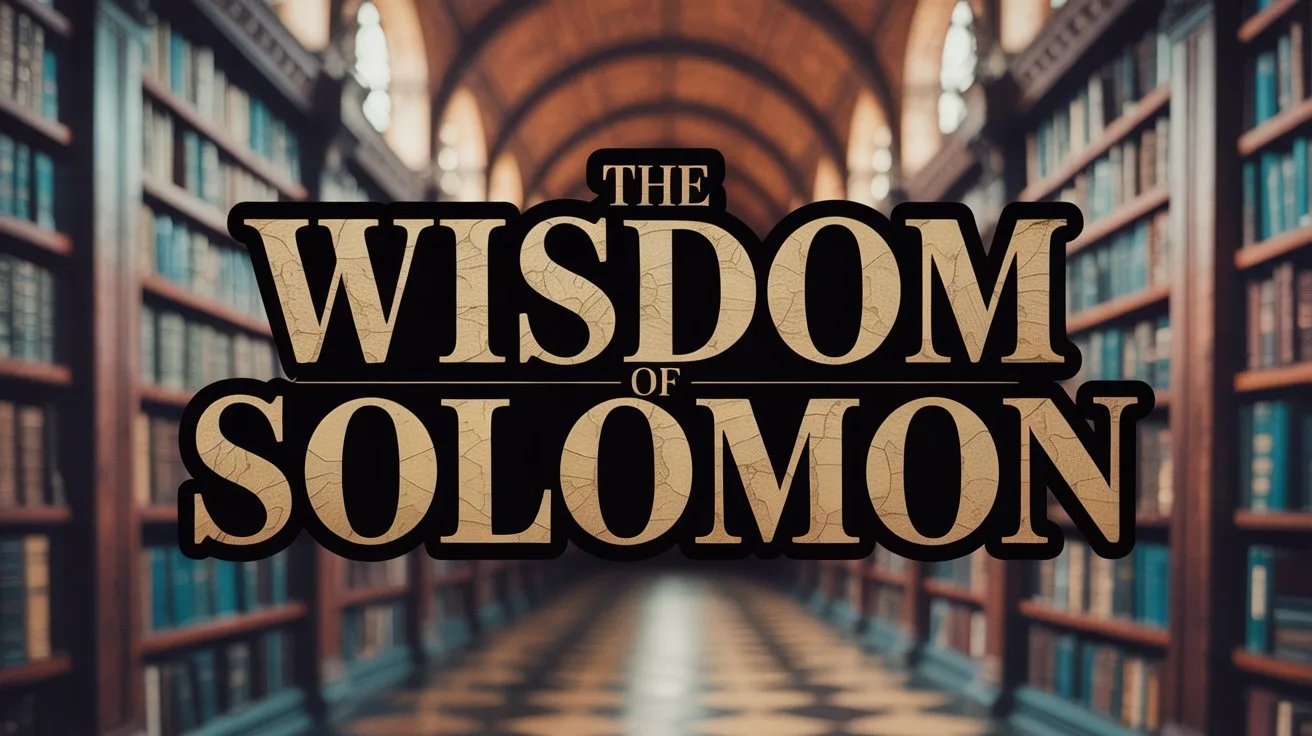Solomon, son of David and Bathsheba, was chosen by God to rule after his father’s death. He is perhaps most famously remembered for his extraordinary wisdom. But as we will see, this gift, though divine in origin, did not prevent him from making deeply foolish and spiritually compromising decisions.
How Solomon Received His Wisdom
Solomon’s wisdom was not inherent; it was given by God in response to a humble request. After Solomon offered sacrifices at Gibeon, the Lord appeared to him in a dream.
“At Gibeon the Lord appeared to Solomon in a dream by night; and God said, ‘Ask! What shall I give you?’” (1 Kings 3:5)
Solomon did not ask for riches, long life, or the death of his enemies. Instead:
“Therefore give to Your servant an understanding heart to judge Your people, that I may discern between good and evil. For who is able to judge this great people of Yours?” (1 Kings 3:9)
This pleased God.
“Then God said to him: ‘Because you have asked this thing, and have not asked long life for yourself, nor have asked riches for yourself, nor have asked the life of your enemies, but have asked for yourself understanding to discern justice, behold, I have done according to your words; see, I have given you a wise and understanding heart, so that there has not been anyone like you before you, nor shall any like you arise after you.’” (1 Kings 3:11–12)
God not only gave him wisdom, but also riches and honor. This wisdom was divinely imparted, not developed through experience or education.
Demonstration of Solomon’s Wisdom
One of the earliest and clearest demonstrations of his wisdom came shortly after, in the case of the two harlots.
“Then the woman whose son was living spoke to the king, for she yearned with compassion for her son; and she said, ‘O my lord, give her the living child, and by no means kill him!’ But the other said, ‘Let him be neither mine nor yours, but divide him.’ So the king answered and said, ‘Give the first woman the living child, and by no means kill him; she is his mother.’” (1 Kings 3:26–27)
This event solidified his reputation in Israel.
“And all Israel heard of the judgment which the king had rendered; and they feared the king, for they saw that the wisdom of God was in him to administer justice.” (1 Kings 3:28)
The Breadth of Solomon’s Wisdom
Solomon’s wisdom was not limited to judgment alone. Scripture tells us:
“And God gave Solomon wisdom and exceedingly great understanding, and largeness of heart like the sand on the seashore.” (1 Kings 4:29)
“Thus Solomon’s wisdom excelled the wisdom of all the men of the East and all the wisdom of Egypt.” (1 Kings 4:30)
He was wiser than all men, and his fame was widespread.
“He spoke three thousand proverbs, and his songs were one thousand and five. Also he spoke of trees, from the cedar tree of Lebanon even to the hyssop that springs out of the wall; he spoke also of animals, of birds, of creeping things, and of fish.” (1 Kings 4:32–33)
His wisdom covered both spiritual and natural knowledge.
Who Came to Hear Solomon’s Wisdom?
The most famous international visitor was the Queen of Sheba.
“And when the queen of Sheba heard of the fame of Solomon concerning the name of the Lord, she came to test him with hard questions.” (1 Kings 10:1)
She was overwhelmed by what she saw.
“Then she said to the king: ‘It was a true report which I heard in my own land about your words and your wisdom. However I did not believe the words until I came and saw with my own eyes; and indeed the half was not told me. Your wisdom and prosperity exceed the fame of which I heard.’” (1 Kings 10:6–7)
This confirmed that Solomon’s wisdom was recognized by the world, yet rooted in the name of the Lord.
What Books Did Solomon Write?
Solomon is credited with writing:
Proverbs – A collection of wisdom sayings, many of which directly reference “the fear of the Lord” as the beginning of wisdom (Proverbs 1:7).
Ecclesiastes – A philosophical reflection on life “under the sun,” where Solomon explores the vanity of worldly pursuits and ultimately concludes, “Fear God and keep His commandments” (Ecclesiastes 12:13).
Song of Solomon – A poetic book celebrating love and marriage.
These writings demonstrate both divine insight and deep self-reflection. Proverbs is filled with godly counsel. Ecclesiastes shows the futility of wisdom apart from God.
The Fall of Solomon: Wisdom Without Obedience
Despite his wisdom, Solomon made grave errors, especially in the latter part of his reign.
“But King Solomon loved many foreign women… from the nations of whom the Lord had said to the children of Israel, ‘You shall not intermarry with them…’ Solomon clung to these in love.” (1 Kings 11:1–2)
“For it was so, when Solomon was old, that his wives turned his heart after other gods; and his heart was not loyal to the Lord his God, as was the heart of his father David.” (1 Kings 11:4)
He built high places for idols and allowed idolatry to thrive in Israel. Though wise in mind, Solomon allowed his heart to become foolish. This is where the distinction between godly wisdom and worldly wisdom becomes critical.
Godly Wisdom vs. Worldly Wisdom
James makes the distinction plain:
“This wisdom does not descend from above, but is earthly, sensual, demonic. For where envy and self-seeking exist, confusion and every evil thing are there.” (James 3:15–16)
“But the wisdom that is from above is first pure, then peaceable, gentle, willing to yield, full of mercy and good fruits, without partiality and without hypocrisy.” (James 3:17)
Godly wisdom begins with the fear of the Lord and always leads to obedience. Worldly wisdom may appear successful, but it leads to self-exaltation, compromise, and destruction. Solomon began with godly wisdom, as evidenced by his judgment, humility, and writings. But over time, he leaned into worldly alliances and sensual indulgence. He knew truth but did not always obey it.
In Ecclesiastes, you can hear the regret. Solomon had it all—riches, power, knowledge—and yet declared it all “vanity.” That is the testimony of a man who knew the truth but drifted from it.
My Final Thoughts
Solomon’s life is a warning as much as it is a wonder. He was the wisest man to walk the earth before Christ. His wisdom was divine. It produced Proverbs. It attracted nations. But it did not keep him from sin when his heart wandered. Wisdom is not a guarantee of holiness. Knowing is not the same as doing. And brilliance is not a substitute for obedience.
Let us seek not just to be wise, but to walk in the fear of the Lord daily, humbly, and loyally. True wisdom is not merely insight, but faithful application of God’s Word.












